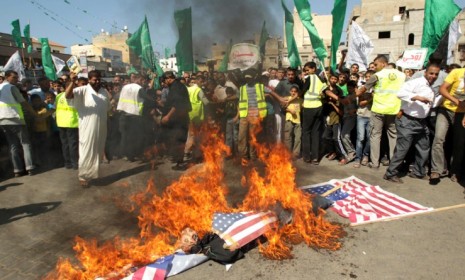Anti-U.S. protests in the Arab world: What's next?
Muslim anger continues to simmer over an amateurish, mysterious, American-made video insulting the Prophet Mohammad. What's going to be the fallout?

A free daily email with the biggest news stories of the day – and the best features from TheWeek.com
You are now subscribed
Your newsletter sign-up was successful
The U.S. has stepped up security at its embassies across the Middle East, bracing for a fourth day of protests stoked by an online movie trailer mocking Islam's Prophet Mohammad. Egyptian police in riot gear, anticipating swelling crowds after Friday's Muslim prayers, blocked roads to the U.S. Embassy in Cairo and clashed with rock-throwing demonstrators. The Islamist group Muslim Brotherhood called for a "million-man march" in the city to protest the obscure, anti-Islam film. Libyan authorities have arrested four suspects allegedly involved in an assault that killed four people, including Ambassador Chris Stevens, at the U.S. Consulate in Benghazi. In the Yemeni capital of Sanaa, where four people died Thursday when police repelled protesters trying to storm the U.S. Embassy, security forces blocked streets surrounding the U.S. mission as demonstrators gathered again early Friday. Leaders in Indonesia, the world's most populous Muslim country, and Afghanistan tried to keep a lid on protests in their countries by blocking the YouTube video fueling demonstrators' anger. How far will the protests go, and where will they lead? Here, three repercussions from the widening turmoil:
1. Islamists are fighting for power
These anti-American riots "are sickening displays of what might be termed bin Ladenism," says Toronto's Globe and Mail in an editorial. Agitators are trying to use a "hateful, amateurish film" — which was "made by a nobody and shown to no one" — to "inflame the Islamic world against the United States." It's not about religion, or even about tweaking the United States. "Islamic radicals who are jockeying for power in Egypt, Libya, Yemen and beyond" are just trying to tap into the passions of the faithful to give them greater political leverage at home. They're getting mixed results in the countries of the Arab Spring — Egyptian President Mohamed Morsi, himself an Islamist, was "slow and soft in his criticism of the violence," while Libya's democratically elected leader, Mohammed Magarief, unequivocally condemned it. "The mob has not taken over in the Arab world, but there are provocateurs hoping it will."
The Week
Escape your echo chamber. Get the facts behind the news, plus analysis from multiple perspectives.

Sign up for The Week's Free Newsletters
From our morning news briefing to a weekly Good News Newsletter, get the best of The Week delivered directly to your inbox.
From our morning news briefing to a weekly Good News Newsletter, get the best of The Week delivered directly to your inbox.
2. This is a critical test for the new Egypt
This crisis has "squeezed" the new leaders who rose to power after the Arab Spring revolts, particularly in Egypt, say David D. Kirkpatrick, Helene Cooper, and Mark Landler in The New York Times. President Morsi and the once outlawed Muslim Brotherhood, which helped lift him to prominence, came to power with a clear "conservative religious mandate," but they have to balance domestic political pressures with their country's international commitments, including a strong, longstanding, and mutually beneficial partnership with the U.S. It took "a blunt phone call" from President Obama to convince Egyptian leaders, who get $2 billion in annual aid from Washington, to second-guess their decision "to first appease anti-American domestic opinion without offering a robust condemnation of the violence." They're backpedaling now, but, with the Brotherhood simultaneously calling for more protests and condemning the storming of the embassy, it's obviously, as one analyst called it, "a difficult dance."
3. Obama's foreign policy is on the line
The U.S. is now suffering the consequences of three and a half years of Obama's disastrously weak foreign policy, says Liz Cheney in The Wall Street Journal. He introduced himself to the Muslim world with an apology tour, going to Cairo in June 2009 and saying that "the fear and anger" after 9/11 "led us to act contrary to our ideals." His immediate response to these protests has been equally "appalling," condemning the deadly attack in Libya but not the storming of the embassy in Cairo, sending the radicals the message that you can attack an American embassy as long as you don't kill anyone. This is why, thanks to Obama, "America is no longer viewed as a reliable ally or an enemy to be feared," so this fiasco proves we can't afford another four years of the same. These events might have posed a problem for Obama in his election campaign, says Clive Crook at The Atlantic, "if he had a semi-capable opponent." But Mitt Romney's "crassly and nakedly opportunistic" attempt to milk the crisis — by slamming Obama over an apology that a Cairo-based diplomat made to Muslims for the film, an apology the White House disavowed — made Romney look small and clueless. Now it's hard to say which candidate will "sustain the greater damage" from this crisis.
A free daily email with the biggest news stories of the day – and the best features from TheWeek.com